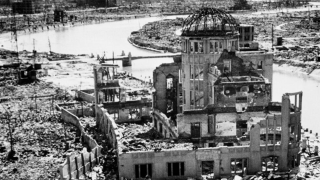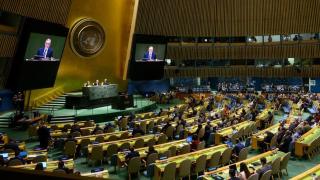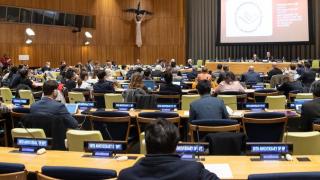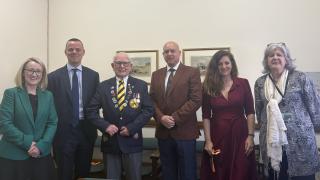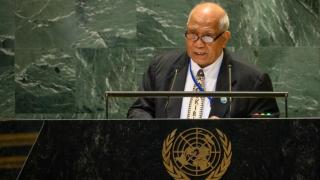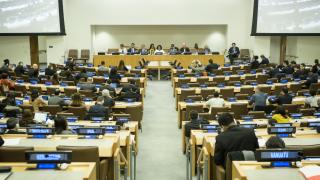
Next week, negotiations will begin at the UN to create a legally-binding treaty to prohibit nuclear weapons. The historic negotiations are mandated by a General Assembly resolution, passed in December with 113 states voting in favour, 35 against, and 13 abstentions. The UK voted against the resolution, joining other NATO members and US allies in opposing the negotiations.
The UK's decision not to participate is at odds with Britain's obligations under the Treaty on the Non-Proliferation of Nuclear Weapons (NPT). It also goes against UK public opinion, with 75 per cent of UK adults believing that the Government should be represented at the UN nuclear disarmament talks, according to a recent poll by YouGov commissioned by Abolition 2000 UK.
Initial negotiations will take place from 27 - 31 March, with a further conference scheduled for 15 June - 7 July 2017.
How did this come about?
The negotiations are the culmination of a drive to eliminate nuclear weapons based on the humanitarian imperative, with states and civil society working together to put the catastrophic environmental, health and societal impacts of any use of nuclear weapons at the forefront of discussions on disarmament.
The broad decision of nuclear-weapon states not to engage with this disarmament movement is a symptom of deteriorating relations between the nuclear ‘haves’ and ‘have nots’.
The 1968 NPT prohibits the 185 non-nuclear signatories from developing nuclear weapons. In exchange, the five signatories that hold nuclear weapons, including the UK, have committed to a process of multilateral nuclear disarmament.
With little visible appetite for disarmament from nuclear-weapon states, this bargain is increasingly called into question. Tensions between states, in part due to dissatisfaction with the slow pace of disarmament, caused a failure of the 2015 NPT Review Conference to agree an outcome.
Given the dangers arising from a lack of international cooperation on nuclear security issues and the potential emergence of a new arms race between the nuclear powers, principled and engaged leadership from nuclear-weapon states is sorely needed.
UK action
The UK has an important role to play. Firstly, it must acknowledge the negative effect that any perceived failure to honour its international obligations could have on the rules-based international system upon which – according to the UK’s own analysis – Britain’s security and prosperity depend.
Secondly, the UK must work energetically to improve relations with non-nuclear-weapon states and take unmistakable steps to demonstrate Britain’s commitment to multilateral disarmament.
UNA-UK has set out its vision for principled UK leadership on the world stage through its Keeping Britain Global campaign. Our recommendations for nuclear disarmament can be found below.
The UK should:
- Reverse its decision not to participate in the 2017 UN nuclear disarmament negotiations and take other unmistakable steps to demonstrate Britain’s commitment on this issue and improve relations with non-nuclear-weapon states.
- Work energetically to restore the health of the NPT regime, including by initiating an inclusive process to work on the 2010 64-point Action Plan and by publishing an annual report on the UK's contribution to its implementation.
- Breathe life into the ‘P5 Process’ talks between the nuclear-weapon states, including by strengthening their agenda and increasing their transparency.
- Review the prominence given to nuclear weapons in the UK’s security doctrines in close consultation with parliament and civil society.
- Use the opportunity of the 2018 UN High Level Conference on Nuclear Disarmament to highlight UK leadership and progress on this issue.
Photo: Organizational Session for UN Conference on Prohibiting Nuclear Weapons. Copyright UN Photo/Manuel Elias


